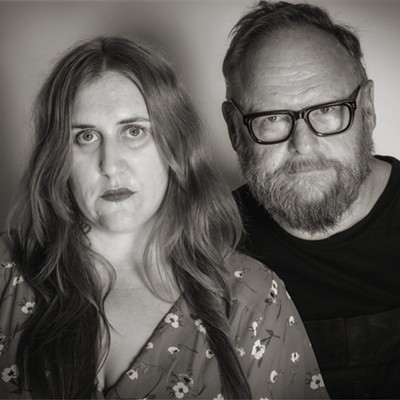The Tucson Artists and Musicians Health Alliance is an organization in its infancy whose ultimate goal is to provide local artists and musicians with a variety of health-care-related services. The third annual Labor Day festival at Club Congress, officially named the 2007 HoCo Festival, part of the Tucson Music and Film Festival, is not only a celebration of all things local music, but a rallying cry for support for area artists and musicians. The Sunday, Sept. 2, activities will focus on getting out information to artists and musicians about services currently available in the city, and all interested musicians and artists who show their support for the alliance will receive a discount on the door price.
The idea for the alliance is something David Slutes, entertainment director at Club Congress and a local musician, has been thinking about for years.
"In the past year, a couple of people really needing health care made me think more about it, and I started to get a little more proactive about it," he explained. "My initial idea was to do something like Sweet Relief, where we could raise money through the music community to support musicians, to be able to quickly hand out money to people in need. Of course, it's never that easy, and the more I got into it, the more I realized how difficult it is to raise money and give it to people."
Slutes heard that Anne-Marie Russell, the executive director of MOCA, was working on a freelancers' union for artists, and they decided to combine forces and focus on health care for both artists and musicians. Slutes had been talking with people in Los Angeles and Austin, Texas, about similar programs for musicians in those areas, and realized that broadening the scope might make the idea more lucrative to the powers that be.
"One thing I learned from Austin is that it took them a great deal of time to convince the community in the city that it was worth nurturing this kind of thing--it has a great economic impact--and if Austin, the music capital of the world, can't get it together, who can?" said Slutes.
Although the alliance is still in the early planning stages, Slutes has received a lot of initial support. The Tucson Pima Arts Council is involved in the planning, and state legislators Steve Farley and Tom Prezelski have shown their support.
"The state legislatures like it, because they know that artists and musicians can drive the kind of thing they're looking to do for the low-cost and underinsured," Slutes said.
"Now we're in the stages of figuring out how it's going to be the most effective. We've established a mission statement, and we've established goals for what we can do in the short-term and goals for the future."
Short-term goals include being an information resource for local artists and musicians to educate them about what's already available through the county, city and state.
"One of the things that we've found that is a big deal is that people don't even know what's out there, so we're going to make it very simple for you: We're going to make it very easy for you to find out what we have," Slutes said.
The Pima Community Access Program, the Arizona Health Care Cost Containment System and University Physicians will have tables set up at Hotel Congress during the night's festivities.
Since the alliance does not yet have official nonprofit status, they are unable to take monetary donations, so Club Congress is offering a discount on Sunday night's $8 door price for anyone interested in signing up to learn more about the alliance--what Slutes is calling a "reverse donation."
Eventually, though, the alliance hopes to be able to provide support for members of the artistic and musical community who need it the most.
"We're also going to look at trying to start a foundation, because my biggest thing is, I want to make sure we get money to people who need it without all of the bureaucracy," continued Slutes. "But we don't want to jump into it so fast that it's not sustainable."
Sunday's event will not only be about information and advocacy, but about garnering community interest and involvement to help build that sustainable future.








